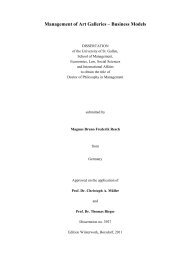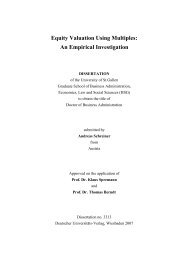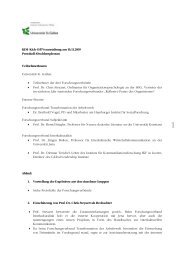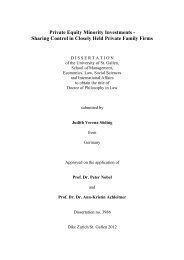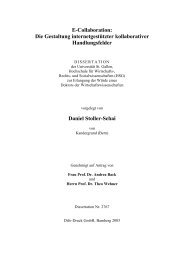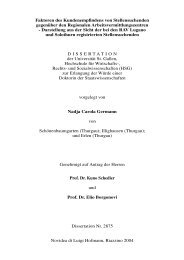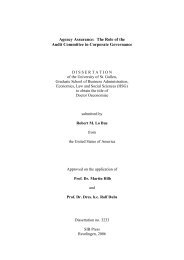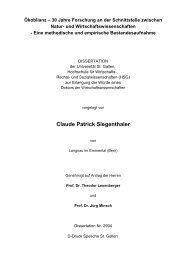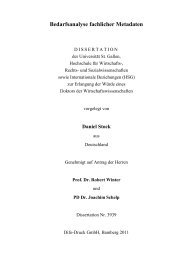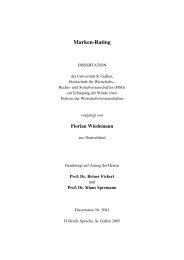The Impact of Direct Democracy on Society - Universität St.Gallen
The Impact of Direct Democracy on Society - Universität St.Gallen
The Impact of Direct Democracy on Society - Universität St.Gallen
- No tags were found...
Create successful ePaper yourself
Turn your PDF publications into a flip-book with our unique Google optimized e-Paper software.
– 36 –seemingly indirect restricti<strong>on</strong> <str<strong>on</strong>g>of</str<strong>on</strong>g> the statutory initiative 51 , because <strong>on</strong>ly fundamentalregulati<strong>on</strong>s should be determined in the form <str<strong>on</strong>g>of</str<strong>on</strong>g> laws, whereas before 2002 any issue couldhave been in a statutory form. <str<strong>on</strong>g>The</str<strong>on</strong>g> intenti<strong>on</strong> <str<strong>on</strong>g>of</str<strong>on</strong>g> this new regulati<strong>on</strong> was to give the cant<strong>on</strong>alparliament the power to regulate organizati<strong>on</strong>al issues, particularly the executi<strong>on</strong> <str<strong>on</strong>g>of</str<strong>on</strong>g> thefederal law, which in Switzerland is carried out by cant<strong>on</strong>al administrati<strong>on</strong>s, in the form <str<strong>on</strong>g>of</str<strong>on</strong>g>parliamentary decrees that, as administrative acts, cannot be challenged by direct democraticrights 52 . This change in the scope <str<strong>on</strong>g>of</str<strong>on</strong>g> the statutory initiative, however, does not affect the value<str<strong>on</strong>g>of</str<strong>on</strong>g> the index <str<strong>on</strong>g>of</str<strong>on</strong>g> direct democracy because no distincti<strong>on</strong> is made between a statutory initiativewith a wide or a narrow scope <str<strong>on</strong>g>of</str<strong>on</strong>g> applicati<strong>on</strong>. In the same period, the requirements <str<strong>on</strong>g>of</str<strong>on</strong>g> thec<strong>on</strong>stituti<strong>on</strong>al initiative remained unchanged.In the cant<strong>on</strong> <str<strong>on</strong>g>of</str<strong>on</strong>g> Freiburg, a new c<strong>on</strong>stituti<strong>on</strong> took effect <strong>on</strong> the 1st <str<strong>on</strong>g>of</str<strong>on</strong>g> January, 2005.Regarding the instituti<strong>on</strong>al setup <str<strong>on</strong>g>of</str<strong>on</strong>g> either the statutory or the c<strong>on</strong>stituti<strong>on</strong>al initiative,however, no change was introduced. Thus, the index <str<strong>on</strong>g>of</str<strong>on</strong>g> direct democracy remains unaffected.<str<strong>on</strong>g>The</str<strong>on</strong>g> sole difference to the old legal system is that for both types <str<strong>on</strong>g>of</str<strong>on</strong>g> initiatives the signaturerequirements are now explicitly stated in the c<strong>on</strong>stituti<strong>on</strong> instead <str<strong>on</strong>g>of</str<strong>on</strong>g> being regulatedexclusively by a cant<strong>on</strong>al law. This complete regulati<strong>on</strong> at the c<strong>on</strong>stituti<strong>on</strong>al level does not,however, diminish the power <str<strong>on</strong>g>of</str<strong>on</strong>g> the electorate to change these requirements through aninitiative because in Freiburg it is (and was) as easy to launch a statutory initiative as tolaunch a c<strong>on</strong>stituti<strong>on</strong>al <strong>on</strong>e.<str<strong>on</strong>g>The</str<strong>on</strong>g> people <str<strong>on</strong>g>of</str<strong>on</strong>g> Schaffhausen adopted a new c<strong>on</strong>stituti<strong>on</strong> that came into force <strong>on</strong> the 1st <str<strong>on</strong>g>of</str<strong>on</strong>g>January, 2003. This new c<strong>on</strong>stituti<strong>on</strong> is <strong>on</strong>e <str<strong>on</strong>g>of</str<strong>on</strong>g> those total revisi<strong>on</strong>s that aimed to modernizethe structure and wording without changing the legal c<strong>on</strong>tent – at least as far as the initiativesare c<strong>on</strong>cerned. In the new c<strong>on</strong>stituti<strong>on</strong>, both types <str<strong>on</strong>g>of</str<strong>on</strong>g> initiatives are now regulated in <strong>on</strong>earticle (art. 27 CC) rather than being dispersed within the c<strong>on</strong>stituti<strong>on</strong> (art. 108, 107 old CCand art. 43 old CC). <str<strong>on</strong>g>The</str<strong>on</strong>g>refore, no change is observed in the values <str<strong>on</strong>g>of</str<strong>on</strong>g> the subindices <str<strong>on</strong>g>of</str<strong>on</strong>g> eitherthe c<strong>on</strong>stituti<strong>on</strong>al or the statutory initiative.51 As well as <str<strong>on</strong>g>of</str<strong>on</strong>g> the mandatory statutory referendum – see secti<strong>on</strong> 4.52 According to Mr. DÜRST, Ratsschreiber in the Regierungskanzlei <str<strong>on</strong>g>of</str<strong>on</strong>g> Glarus, in practice this restricti<strong>on</strong> was<strong>on</strong>ly carried out to solve an academic battle over whether all executi<strong>on</strong>s <str<strong>on</strong>g>of</str<strong>on</strong>g> federal laws needed to be based <strong>on</strong>a so-called cant<strong>on</strong>al introductory law ('Einführungsgesetz') that would, under the old c<strong>on</strong>stituti<strong>on</strong>, have beensubject to a mandatory referendum. In political practice, he claims, no restricti<strong>on</strong> <str<strong>on</strong>g>of</str<strong>on</strong>g> direct democratic rightswas caused by this amendment in May 2002.



